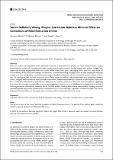You’re Definitely Wrong, Maybe: Correction Style Has Minimal Effect on Corrections of Misinformation Online
Author(s)
Martel, Cameron; Mosleh, Mohsen; Rand, David Gertler
DownloadMaC 9(1) - You're Definitely Wrong, Maybe Correction Style Has Minimal Effect on Corrections of Misinformation Online.pdf (3.155Mb)
Publisher with Creative Commons License
Publisher with Creative Commons License
Creative Commons Attribution
Terms of use
Metadata
Show full item recordAbstract
How can online communication most effectively respond to misinformation posted on social media? Recent studies examining the content of corrective messages provide mixed results—several studies suggest that politer, hedged messages may increase engagement with corrections, while others favor direct messaging which does not shed doubt on the credibility of the corrective message. Furthermore, common debunking strategies often include keeping the message simple and clear, while others recommend including a detailed explanation of why the initial misinformation is incorrect. To shed more light on how correction style affects correction efficacy, we manipulated both correction strength (direct, hedged) and explanatory depth (simple explanation, detailed explanation) in response to participants from Lucid (N = 2,228) who indicated they would share a false story in a survey experiment. We found minimal evidence suggesting that correction strength or depth affects correction engagement, both in terms of likelihood of replying, and accepting or resisting corrective information. However, we do find that analytic thinking and actively open-minded thinking are associated with greater acceptance of information in response to corrective messages, regardless of correction style. Our results help elucidate the efficacy of user-generated corrections of misinformation on social media.
Date issued
2021-02Department
Sloan School of Management; Massachusetts Institute of Technology. Department of Brain and Cognitive SciencesJournal
Media and Communication
Publisher
Cogitatio
Citation
Martel, Cameron et al. "You’re Definitely Wrong, Maybe: Correction Style Has Minimal Effect on Corrections of Misinformation Online." Media and Communication 9, 1 (February 2021): 120-133 © 2021 Authors
Version: Final published version
ISSN
2183-2439